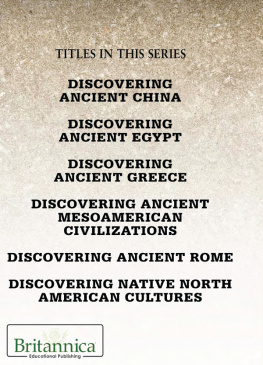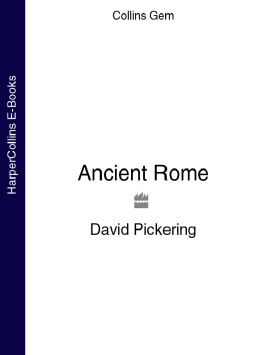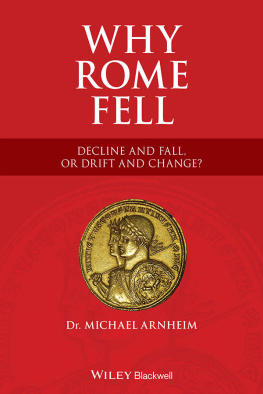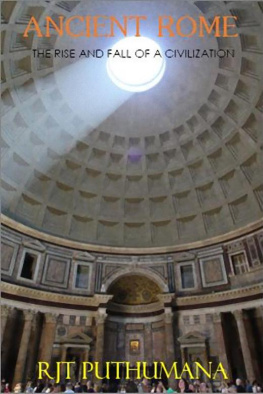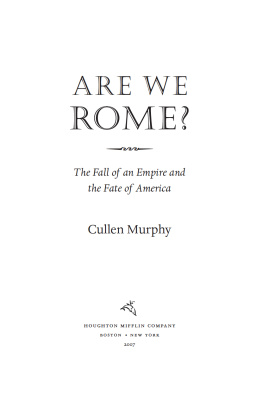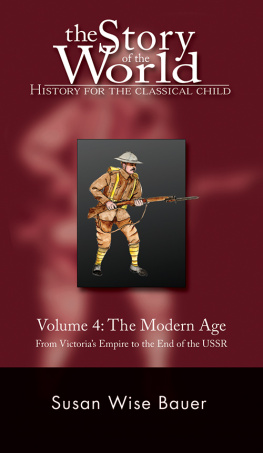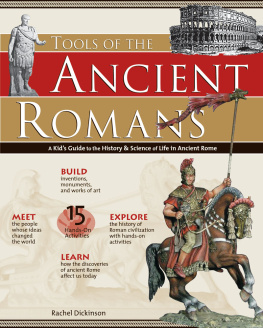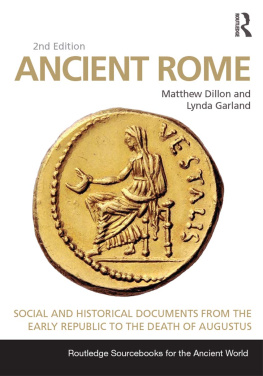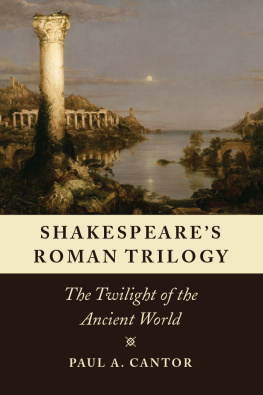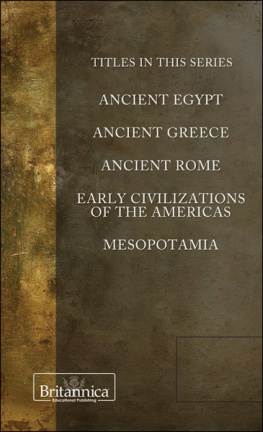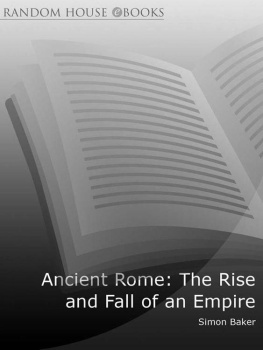

Published in 2015 by Britannica Educational Publishing (a trademark of Encyclopdia Britannica, Inc.) in association with The Rosen Publishing Group, Inc.
29 East 21st Street, New York, NY 10010
Copyright 2015 The Rosen Publishing Group, Inc., and Encyclopdia Britannica, Inc. Encyclopdia Britannica, Britannica, and the Thistle logo are registered trademarks of Encyclopdia Britannica, Inc. All rights reserved.
Distributed exclusively by Rosen Publishing.
To see additional Britannica Educational Publishing titles, go to rosenpublishing.com.
First Edition
Britannica Educational Publishing
J. E. Luebering: Director, Core Reference Group
Anthony L. Green: Editor, Comptons by Britannica
Rosen Publishing
Hope Lourie Killcoyne: Executive Editor
Christine Poolos: Editor
Nelson S: Art Director
Nicole Russo: Designer
Cindy Reiman: Photography Manager
Cataloging-in-Publication Data
Crompton, Samuel Willard.
Discovering Ancient Rome/Samuel Willard Crompton.
pages cm.(Exploring ancient civilizations)
Includes bibliographical references and index.
ISBN 978-1-6227-5837-1 (eBook)
1. RomeJuvenile literature. I. Title.
DG77.C68 2015
937dc23
2014021752
Photo credits: Cover, pp. 1, 3 Phant/Shutterstock.com; pp. 6-7 cudak/Shutterstock.com; p. 9 Bridgeman Art Library, London/SuperStock; pp. 10, 15 De Agostini/SuperStock; p. 11 Private Collection/The Stapleton Collection/Bridgeman Images; p. 13 Fine Art Images/SuperStock; p. 18 SF photo/Shutterstock.com; p. 19 Stephen Alvarez/National Geographic Image Collection/Getty Images; p. 20 PeterHermesFurian/iStock/Thinkstock; p. 23 Culture Club/Hulton Archive/Getty Images; pp. 25, 28 North Wind Picture Archives; p. 27 Dorling Kindersley/Thinkstock; p. 30 De Agostini Picture Library/Bridgeman Images; p. 32 Duncan Walker/E+/Getty Images; p. 33 DEA/G. Dagli Orti/De Agostini/Getty Images; p. 36 The Bridgeman Art Library/Getty Images; p. 37 Stephen Finn/Shutterstock.com; p. 39 Danilo Ascione/Shutterstock.com; p. 42 Heritage Images/Hulton Fine Art Collection/Getty Images; p. 43 eFesenko/Shutterstock.com; cover and interior graphics iStockphoto.com/pixonaut (patterned banners and borders), HorenkO/Shutterstock.com and Freckles/Shutterstock.com (background textures).
CONTENTS
W hen we think of Rome, we naturally visualize the Colosseum, the grandest of all Roman buildings. We also think of the Forum, the first and greatest of all government buildings that contributed to build our approach to modern democracy. Yet another image that comes to mind is of the aqueduct system, which brought fresh, clean water from the countryside. But when we think of the Roman people, we should, perhaps, be most impressed by their staying power. Rome was a republic for almost five hundred years and then an empire for another five hundred. No other people built so much or lasted so long at the top. How did they accomplish it?

The Forum was the center of Roman government, but it was also the center of the Roman world. Distances throughout the Roman Empire were measured by the miles that separated locations from the Forum.
This book treats ancient Rome in four distinct chapters. The first describes the rise of Rome, and the second its fall. The transition from kingdom to republic and from republic to empire is discussed. The third chapter examines how the Romans lived and how they experienced their world. And the fourth and final chapter tells how Romes accomplishments continue to influence the world today. When all is said and done, the Romans will be revealed for what they really were: builders of our world.
R ome wasnt built in a day. In fact, it took about seven hundred years to progress from a small town on the Tiber River to an empire that straddled the entire Mediterranean world, meaning Italy, Greece, Egypt, and North Africa, as well as the many islands of that inland sea.
Myths and Legends
Romans felt they were special, right from the very beginning. One of their foundation stories, which is probably mythical, is that Aeneasone of the princes of Troyescaped the Greek destruction of his city and wandered for many years before founding the city of Rome. Another story is that two brothers, Romulus and Remus, who were raised by a she-wolf, founded Rome together.
During the early years, roughly 753509 BCE , the Romans developed a complex religious belief system, based on the worship of many gods and goddesses. The gods and goddesses of ancient Rome were a jealous, envious, and rather human-like group. They fought each other frequently, and sometimes they involved humans in their quarrels.

Romulus and Remus, raised by a she-wolf, were believed to be the founders of Rome. The city fathers marked the traditional date as 753 BCE .
Roman Government
The first settlers of Rome were people known as Latins. The area around Rome was called Latium. Sometime around 600 BCE , Rome was conquered by the Etruscans, a people to the north. Rome was then ruled by a series of Etruscan kings. But in 509 BCE , the Romans overthrew the last Etruscan monarchTarquin the Proudand started a republic.
HERCULES VS. MARS
One of the best-known quarrels in classical mythology was between Mars, the god of war, and Hercules. They fought many times, with Hercules usually the winner. The nastiest of their fights came when Hercules killed Marss mortal son, Cycnus. Mars descended from the heavens to take revenge, but Hercules wounded him with a pitchfork.

Mars was the god of war, and, as such, he was worshipped by virtually all the leading politicians and generals. The city-state of Rome showed its martial prowess early on, and this only continued as the city-state evolved into a republic and, finally, an empire.
During the early years of the republic, Rome was small enough that the general body of the male citizens could be summoned whenever a major decision was needed. Over time, this became unworkable because the Roman population grew so rapidly. There just was not enough room for all the citizens to gather in one place. Once that level was reached, Rome became a representative republic, meaning that the citizens voted for men to represent them.
Developed over about two centuries, the Roman Republic was a clever combination of monarchy, aristocracy, and democracy. Two consulselected each year by a military body called the centuriate assembly (comitia centuriata)were the chief executives of the republic. Rome believed in having two men at the top so that if one were injured or disabled, the other could fill his shoes. Imagine the United States having two presidents leading the country.


